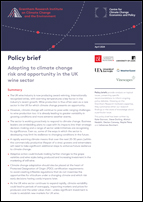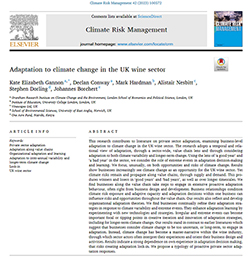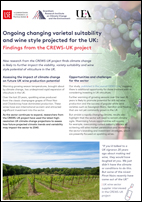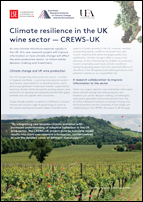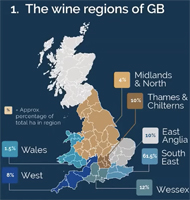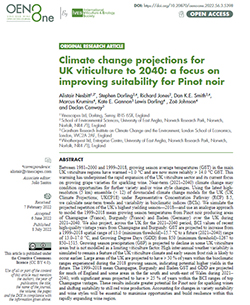Climate resilience in the UK wine sector – CREWS-UK
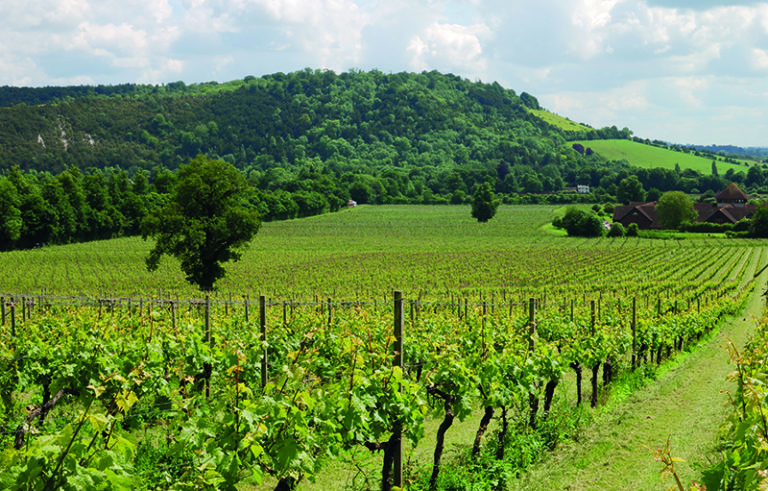
As cool climate viticulture expands rapidly in England and Wales, this new research project will improve information on how climate change will affect the wine production sector to inform better decision-making, investment and adaptation.
The project is a collaboration between climatologists, wine sector specialists and social scientists from the Grantham Research Institute and the University of East Anglia.
Project activities and aims
1. Mapping and analysing climate trends and impacts on UK grape-growing
The project will capitalise on the Met Office’s launch of new UKCP18 climate projections to explore how critical growing season characteristics – including frost risk – may change over the coming decades (recognising that the typical lifetime of a cool-climate vine is around 35 years). Building on the UEA team’s earlier published research on the development of the sector to date, we will show how projected climatic trends and variability to 2050 may impact on the sector. The guidance we produce will enhance resilience to climate change over the coming decades.
| Background: climate change and the UK wine sectorThe UK’s burgeoning wine production sector – located in England and Wales – is winning international acclaim and awards, particularly for its sparkling wines, and is attracting significant investment interest. Supported by warming climate trends during the growing season, winemakers are opening new vineyards and planting more grape varieties that are popular with consumers. Vineyards now cover around 2,500 hectares, an increase of 246% on 2004 levels, the year in which sparkling wine started to dominate production.Grape-friendly climate conditions in 2018 led to a record harvest and may be a sign of good things to come as the overall warming trend seems likely to benefit some aspects of grape-growing in the UK. However, weather and growing season conditions fluctuate from year to year, meaning that yields and grape quality vary significantly. Climate change is likely to cause more extremes and hence further threaten the stability of production. Current uncertainty over future climatic conditions during the growing season and their potential effects on viticulture in the UK exposes both existing producers and potential investors to an unquantified risk.See Nesbitt A, Kemp B, Steele C, Lovett A, Dorling S (2016) Impacts of recent climate change and weather variability on the viability of UK viticulture – combining weather and climate records with producers’ perspectives. Australian Journal of Grape and Wine Research 22: 324-335 |
2. Assessing ways to support climate change adaptation in UK wine production
We will explore how different parts of the sector may be affected by and respond to climate stresses and opportunities, from production to consumption. We will also explore how decisions are made within the sector over the development and application of strategies for adapting to climate change. Understanding these processes will help us to assess ways to support this rapidly expanding agricultural sector to be more economically sustainable.
The UK’s wine production sector is an ‘early adopter’ of climate change adaptation – a climate-sensitive sector already making climate-change-related decisions. We can use the sector as an example and study how actors within it take these decisions. In particular, the hot, dry summer and bumper harvest of 2018 can illustrate how a one-off event influences decision-making, set within the context of the sector’s perceptions of long-term climate change trends.
Project outcomes: user-friendly information for a resilient future
By integrating new bespoke climate scenarios with increased understanding of adaptive behaviour in the UK wine sector, the project aims to translate model results into more user-relevant information, contextualised to suit the detailed needs of different stakeholders. It will support the significant current interest in investing in the wine production sector by providing actionable information based on sound science and collaboration between experts.
This work is supported by UK Research and Innovation SPF UK Climate Resilience programme [grant reference number NE/S016848/1].
A policy brief summarising key findings from the CREWS-UK project on enhancing climate resilience in the UK wine sector is available here
A research paper, published in Climate Risk Management, is available here
A two-page non-technical overview of research findings (September 2022) is available here
A two-page overview of the project is available here
A video presentation: Climate risks to UK wine – Declan Conway, Steve Dorling, Kate Gannon is available here
Climate change projections for UK viticulture to 2040: a focus on improving suitability for Pinot noir (published in OENO One) July 2022


